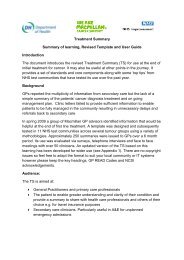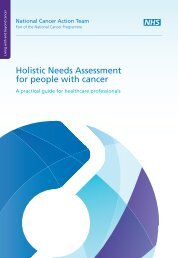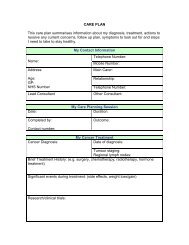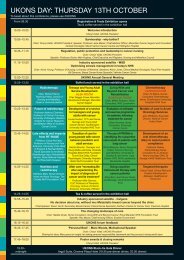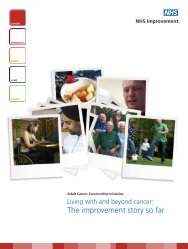HOPE Protocol [PDF, 420KB] - National Cancer Survivorship Initiative
HOPE Protocol [PDF, 420KB] - National Cancer Survivorship Initiative
HOPE Protocol [PDF, 420KB] - National Cancer Survivorship Initiative
Create successful ePaper yourself
Turn your PDF publications into a flip-book with our unique Google optimized e-Paper software.
activities, and health distress), as well as decrease days in the hospital (The British Liver<br />
Trust, 1999).<br />
This gave rise to the concept of the expert patient and the introduction in the UK of the<br />
Expert Patient Programme (EPP) (an anglicised version of the CDSMP) in 2001 (DH, 2001).<br />
Like the CDSMP, the EPP is a lay-led self-management programme for all long-term<br />
conditions. The programme was motivated by the ‘Your Health, Your Care, Your Say’<br />
consultation showing that people with long-term conditions, for which cancer has now<br />
become, desire more control of their health via self-management (DH, 2006a). Evaluations<br />
of the EPP have provided support for the programme’s utility, but little engagement from<br />
health professionals has been highlighted as a potential limitation for cancer survivors<br />
(Wilson, 2008), and the respective benefits of lay versus professional trainers is yet<br />
unproven (Chodosh and Morton et al., 2005)<br />
Similarly, Macmillan provide the ‘New Perspectives course, a cancer version of the CDSMP<br />
(previously the ‘Living with <strong>Cancer</strong>’ course), a free six-week course for people living with and<br />
beyond cancer, which is facilitated by trained tutors who have also experienced cancer.<br />
Attendees meet each week for two and a half hours to learn new skills and techniques.<br />
Feedback from participants has been encouraging, and particularly favourable in terms of<br />
the positive thinking and goal-setting components of the course. A limitation of the course is<br />
the inflexibility of the programme, since tutors are required to follow guidelines rigidly.<br />
Interest is being shown in establishing whether a ‘co-creating health model’ might offer better<br />
outcomes. The Health Foundation uses the term ‘co-creating health’ to describe an active<br />
and collaborative partnership between patients and health professionals (Coulter and Ellins,<br />
2006). For guided self-management to be successful, a positive patient/physician<br />
relationship has been shown to be a key factor (Coulter, 1997; Clark and Gong, 2000;<br />
Holman and Lorig, 2000). In terms of patient preference, nurse-delivery is most often<br />
favoured (Pennery and Mallet, 2000).<br />
Taking into consideration the limitations of previous self-management programmes, the<br />
Helping Overcome Problems Effectively (<strong>HOPE</strong>) SMP, has been selected for this pilot study.<br />
Designed by Dr Andy Turner and Dave McHattie of Coventry University, <strong>HOPE</strong> is set within<br />
the theoretical framework of positive health psychology. It draws on evidence-based<br />
techniques to help enhance participants’ well-being and motivation and has been shown to<br />
improve positive affect (Barlow et al. 2000). Interestingly, 83% of participants attending<br />
Macmillan’s LWC Programme rated the positive thinking activity as beneficial, indicating the<br />
potential utility of a programme such as <strong>HOPE</strong> for cancer survivors. The programme also<br />
offers flexibility in that participants contribute to the final content of the course. The aim is to<br />
eventually integrate such a programme into service delivery.<br />
In order for this to be achieved, a mixed methodology approach will be required for the<br />
assessment of the pilot SMP, utilising both quantitative and qualitative data. Such an<br />
approach has been recognised as being essential in gaining a comprehensive<br />
understanding of the human experience (Yardley and Bishop, 2008). Any outcome<br />
measures utilised throughout the assessment will have undergone a comprehensive<br />
appraisal (Davies, 2009a,b).<br />
20/08/09<br />
3


![HOPE Protocol [PDF, 420KB] - National Cancer Survivorship Initiative](https://img.yumpu.com/32566432/3/500x640/hope-protocol-pdf-420kb-national-cancer-survivorship-initiative.jpg)
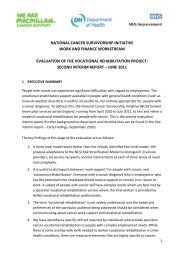
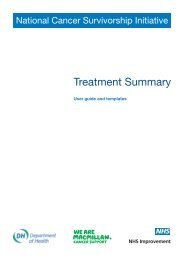
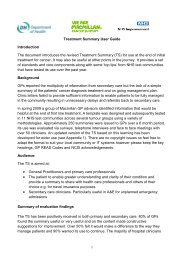
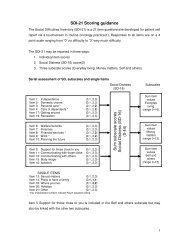
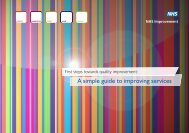
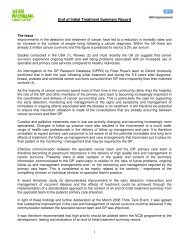
![Download the how to guide [PDF] - Macmillan Cancer Support](https://img.yumpu.com/47067428/1/184x260/download-the-how-to-guide-pdf-macmillan-cancer-support.jpg?quality=85)
